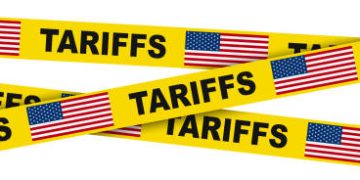Supply Chain Report – 10/08/2025
Talks between U.S. President Donald Trump and Canadian Prime Minister Mark Carney concluded on Tuesday without a breakthrough on a long-awaited tariff agreement, as both sides continue efforts to resolve ongoing trade frictions affecting key sectors of the North American economy.
The meeting, held at the White House, was aimed at finding common ground on the tariffs imposed by the United States that have affected Canadian exports of steel, aluminum, automobiles, and forestry products. Despite high expectations and positive remarks during the talks, no concrete deal was reached, leaving industrial stakeholders in both countries awaiting further developments.
Canada-U.S. Trade Minister Dominic LeBlanc described the meeting as “successful, positive and substantive,” noting that progress had been made on several fronts but offering no details about the specific issues preventing a finalized agreement. LeBlanc emphasized that both governments remain committed to constructive engagement and that negotiations would continue in the days ahead.
According to Canadian officials, LeBlanc will stay in Washington to continue discussions after Prime Minister Carney’s departure, focusing on trade measures involving the steel, aluminum, and energy sectors — industries that have been heavily affected by the ongoing tariffs. The minister added that both sides are seeking a “balanced outcome” that protects workers and enhances economic stability.
U.S. Seeks Domestic Advantage
During the talks, President Trump reiterated his administration’s view that the United States and Canada share a competitive economic relationship, describing it as a “natural conflict” between two advanced manufacturing nations. Trump expressed his intent to strengthen domestic production by reducing reliance on imported Canadian steel and automobiles, saying the U.S. aims to prioritize “made-in-America” goods.
The President also stated that an entirely tariff-free deal was not under consideration at this time, remarking, “We are going to have tariffs.” Trump, however, indicated openness to further discussions to create a more structured and fair trade framework under existing agreements such as the Canada-U.S.-Mexico Agreement (CUSMA).
Analysts note that Trump’s comments reflect his administration’s broader trade policy approach, which emphasizes domestic production and the use of tariffs as leverage in bilateral negotiations. The policy has drawn both support and criticism from industry groups and policymakers who say the measures have mixed results on manufacturing jobs and consumer prices.
Canadian Response and Political Reactions
The lack of a formal agreement has generated political and economic concern in Canada. Ontario Premier Doug Ford, whose province hosts much of Canada’s industrial base, called on the federal government to take a firmer stance if no progress is made. “Sit down, let’s get a deal or let’s start hitting back,” Ford said, urging Carney to consider reciprocal tariffs to protect Canadian industries.
Conservative Party Leader Pierre Poilievre also criticized the outcome, stating that Prime Minister Carney had yet to deliver tangible results in the ongoing negotiations. “Still no deal, still no victory,” Poilievre said, arguing that Canada’s trade position has weakened under the current government.
Economic observers in both countries note that prolonged uncertainty over tariff policy has disrupted cross-border supply chains and investment plans. Several Canadian manufacturers have reported declining output and postponed expansion projects due to higher input costs and volatile trade terms.
Background and Economic Implications
The trade discussions between Washington and Ottawa have been ongoing for several months, with tariffs remaining a key sticking point. The U.S. tariffs, originally imposed under Section 232 of American trade law, were justified on national security grounds and have affected multiple categories of imports.
Canada has argued that such tariffs are unjustified given the integrated nature of North American supply chains. Canadian officials maintain that regionally cooperative trade policies — rather than protectionist measures — are essential to ensuring stable employment and competitive pricing in both markets.
The steel and aluminum industries have been particularly affected, with Canadian exports declining amid the higher costs imposed by tariffs. The automotive sector, another pillar of the bilateral trade relationship, has also faced challenges due to disruptions in parts supply and production schedules.
Economists say that resolving the dispute is critical for maintaining trade stability between the two nations, whose economies are closely intertwined through the North American trade corridor. According to recent data, Canada remains one of the largest trading partners of the United States, with billions of dollars in goods crossing the border daily.
Next Steps and Ongoing Negotiations
Minister LeBlanc confirmed that technical-level discussions would continue between trade officials to explore tariff relief mechanisms and address structural issues within existing trade frameworks. Both sides are expected to review policy options to align tariffs more closely with sectoral competitiveness and supply chain resilience.
While optimism remains cautious, officials close to the discussions believe that incremental progress could pave the way for a more comprehensive trade understanding later this year. However, any significant policy change will likely require further negotiation and political consensus in both capitals.
For now, industries affected by the tariffs continue to operate under uncertainty. Business associations in Canada have urged both governments to expedite talks, emphasizing that stable trade relations are essential for long-term investment and job creation.
Broader Impact
The absence of a breakthrough comes at a time when both economies are seeking to strengthen growth amid global market challenges. Trade experts warn that continued tariff tensions could slow recovery in manufacturing sectors and add to inflationary pressures, as higher production costs are often passed on to consumers.
Despite the current impasse, diplomatic observers note that both governments have maintained an overall tone of cooperation and mutual respect, suggesting that negotiations remain on track.
The coming weeks will be critical in determining whether the two sides can translate goodwill into a concrete agreement that supports the goals of regional competitiveness, economic security, and stable bilateral relations.
#TradeNews #CanadaUSRelations #TariffUpdate #EconomicPolicy #ManufacturingNews















